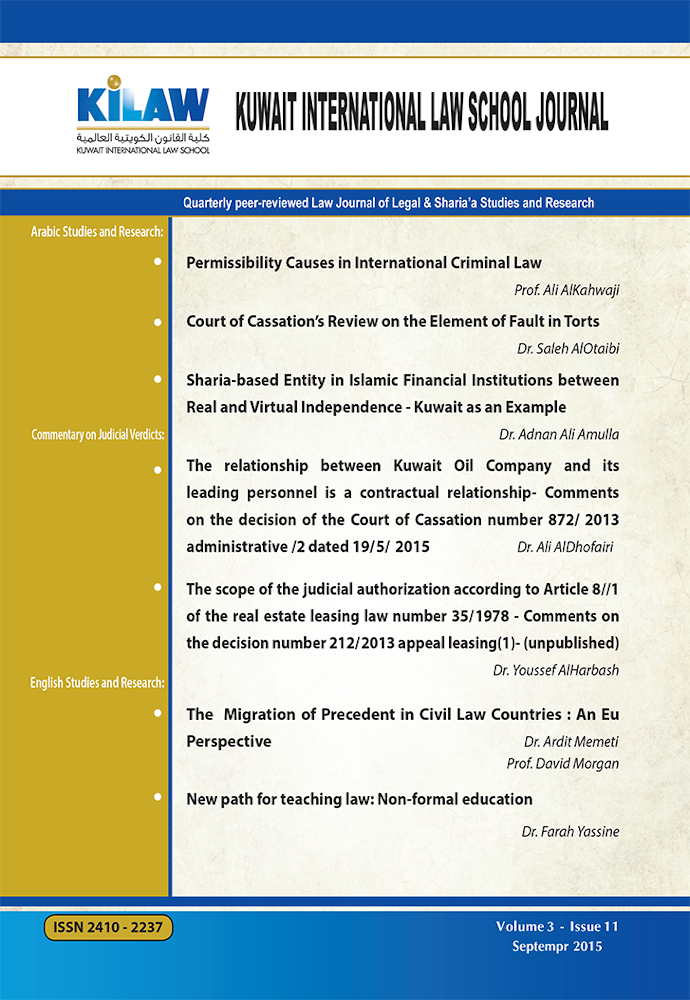Chief-in-Editor Prof. Badria A. Al-Awadi
This new issue of the Kuwait International Law School Journal is full of academic legal research papers and studies covering various fields. It follows two special issues consecrated to the papers that were discussed in KILAW’s second annual conference on the right to privacy in light of current challenges. In addition to the importance of this evolving topic that interests individuals, communities and States, the wide participation of Arab and foreign legal professors and thinkers and the extreme value of their researches, were a major factor to allocate two special issues for these researches. This was an added value offered by the Journal within its mission to encourage legal thinking and positive interaction with legal challenges faced by Arab and Muslim societies or relevant specific categories or sectors.
Therefore, in the framework of this interactive and innovative spirit, the issue number 11 of Kuwait International Law School Journal is published including new sections and covering important topics in the economic and sharia fields, mainly two comments written respectively by dr. Ali AlDhofairi and dr. Yousef AlHarbash on two new Kuwaiti judicial decisions. The first one is issued of the Cassation Court and recognizes a new principle in the relationship between the Kuwaiti Oil Company and its leading personnel based on the contractual relationship between the two parties, and the second is issued of the Commercial Appeal Court and concerns the scope of the judicial license upon Article 8/1 of the law of real estate leasing. In this second article the researcher concluded that the judgement does not comply with the provisions of the leasing law nor with the general rules.
Moreover the issue includes as well, and in the same context, a research for dr. Saleh AlOtaibi on the “Court of Cassation’s Review on the Element of Fault in Torts”, through successive jurisprudence where he concluded that the judiciary, especially the Court of Cassation, is required to define the principle of fault according to social changes upon its legislative description in Article 227 of the civil code, where the fault is considered as a wrongful act and where there is no mention of what is really meant by the wrongful act or of the criteria that would lead to such specification.
On the other hand, the issue included a study for Professor Ali ElKahwaji on “The Permissibility Causes in International Criminal Law” where he discussed the status of the right to defense in sharia law and the right to equal treatment in the international laws, principles and customs, and where he covered various texts and facts concluding that the relevant rights are considered as permissibility causes in International Criminal Law.
As for the important topics in the economic and sharia fields, the issue includes a study for dr. Adnan AlMulla on the “Sharia-based Entity in Islamic Financial Institutions between real and virtual independence- Kuwait as an example”. This article tackles the role of Fatwa institutions and sharia-based supervision regarding the orientation of Islamic financial institutions towards working according to sharia rules, through religious positions about activities, products and services that are provided in the banking and capital markets, knowing that these religious institutions face obstacles, mainly the dominance of administrative boards directly or indirectly which affects negatively their impartiality and independence while assuming their allocated functions.
The researcher assessed the current status of sharia in the Islamic financial institutions suggesting some solutions for the weaknesses and shortcomings in making this entity fully independent. He also focused on some specific conditions and requirements regarding the members of this sharia-based entity and its position concerning the breaches of the administrative board of its decisions and its misuse of power. And the researcher suggested to establish a new sharia-based entity in the Islamic financial institutions considering that this would be in compliance with the required conditions in order to achieve objectivity and independence of sharia-based institutions.
The issue included as well a report on a conference held in France in the current academic year on the Constitution and social protection in addition to some Master’s thesis abstracts on many customs followed in the Kuwaiti Parliament. These are sections that inform researchers about the orientations of legal thinking in international conferences and about the recommendations of Masters’ and PhD’s thesis that are significant and distinguished when it comes to their topics and their elaboration methods.
We hope that the legal research materials will impress our readers and we confirm that we will make sure to render this variety and innovation a permanent path to be followed in our Journal through further legal thinking, openness and expansion. In this perspective, we invite thinkers, researchers, experts and legal specialists in the Arab world to contribute to our Journal with their researches, studies and comments, and we guarantee that their research will be valued and appreciated and will reach relevant interested parties in the Arab societies.

